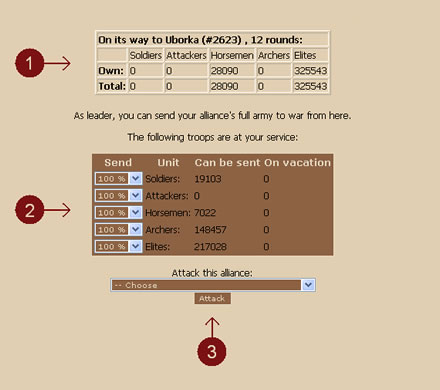War in 1/A
Alliance attacks
An alliance attack takes place when one alliance attacks another alliance.
The attack is started by the leader of the alliance. The leader has control
over the entire army of the members. To attack, the leader needs to choose a
target and the units he/she wishes to send. A percentage of each unit type
needs to be given, this percentage will be the same for all members. You
cannot send all elites of one country, and none of another.
The distance between the alliances is based on their values.
To compensate the risks of an alliance attack (several countries can stay
defenceless), you can conquer a lot of land this way. The amount of
conquered land
depends on the value difference of the alliances, the difference of the
number of members, the alliances' relation towards each other, and the size
of the biggest members (see "numbers" section below). You gain the most land
if the number of members is the same in both alliances.
Members of the winning alliance receive equally from the conquered land. This
is true even if a certain member sent no units (for example all elites were
sent to attack, and a country had no elites).
The leader can only send troops from countries that are not on
vacation.
A maximum of 5 alliance troops can be sent out to attack at any given
moment from the same alliance.

- This is the attacking army. The top line shows your contributed units,
the bottom line shows the total.
- This is where the leader selects what percent of the units are to be sent
out to attack.
- This is where the leader chooses who to attack.
On the defending side, the entire defense value of the alliance counts.
Countries on vacation are a little exception: only one third of their
defense value is added to the total defense. It is important to note that
only countries that were already part of the alliance when an attack started
count. You can accept new members into the alliance once an attack has been
started against you, but they will not help yet.
If the attacking forces are stronger than the defending ones, the lost land
is proportional to the size of the defending countries. Bigger members of
the alliance lose more land, while smaller members lose less.
Alliance vacation
Alliances that are on vacation cannot be attacked. See
Alliances in the 1/A group help
for more information.
If you attack with an army that is bigger than you have space for
If you send more units on an alliance attack than you have space for, the
usual desertion takes place (see:
War help).
Numbers
To calculate the attack value of an attack, take the following values of
each member, and add them together:
- attack value of units,
- military mood,
- military science,
- racial specialities.
To calculate the defense value of an attack, take the following values of
the countries already members of the alliance when the attack started, and
add them together:
- defense value of units (only one third for countries on vacation!),
- bonus for archers in forts,
- military mood,
- defense of forts,
- military science,
- racial specialities.
|
Numbers
There is a minimum defense value for alliance attacks, too, this is 100.000
times the number of defending members.
|
Numbers
Difference in the number of members can reduce the amount of conquered land.
Each country's difference reduces the effectiveness by 1%. This does not
mean that you will get 99% of the original with a 1-member difference! This
means that if the original conquer would be 6%, a 1-member difference will
only give 5%, a 2-member difference will give 4%, a 3-member diffrence will
only give 3% and so on. It IS possible to conquer zero acres of land.
|
Numbers
Another factor determining the amount of land conquered is the proportion of
the two biggest members of the alliances. If the biggest member of one
alliance is at least 3 times as big as the biggest member of the other
alliance, then the conquered land will be zero acres. The amount of land
conquered is not reduced as long as this proportion remains below 1,5.
Between 1,5 and 3 the amount conquered is evenly reduced from 100% to 0%.
|
Generally, one-on-one attacks are the same as elsewhere, with two
exceptions:
Both the attacker and the defender can only count on himself/herself. No
helping troops can be asked for from allies.
Difference in the number of members of the alliances reduces the loot. You
get the most loot if the country you attack is in an alliance that has the
same number of members as your alliance. The bigger the difference in the
number of members is, the less the loot will be.